
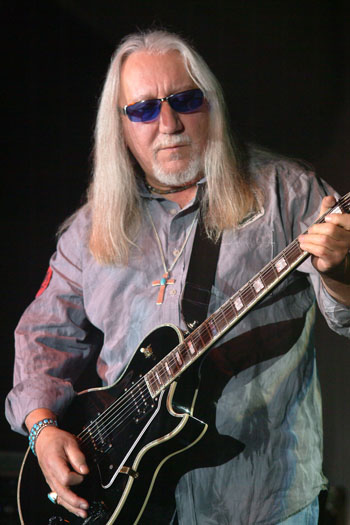
With over 40 years on the road, a 22 album history, all the
requisite tales of rock & roll excess, and a cycle of success,
struggle and ultimate global triumph, Uriah Heep really do
adhere to the label of heritage rock.
The band's 23rd album release, 'Into The Wild' carries on where
the impressive comeback album 'Waking The Sleeper' left off, as
Heep have reconnected with the contemporary rock scene.
And unlike many of their contemporaries Uriah Heep remain one
of the hardest working bands on the circuit.
Founder member and guitarist Mick Box took time out from
rehearsing a brand new set - rumoured to include the pick of the
last 4 decades - to talk to Pete Feenstra about the past, the
present and the on going future of a 'people's band' that just
keeps on delivering.
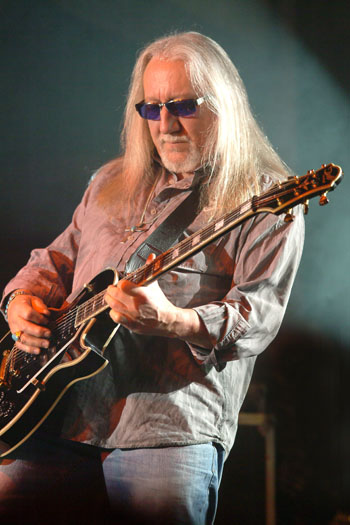
You've said in the past that; 'We're always looking for new ways
of doing things'; does that partly explain Heep's longevity?
Did I say that. (laughs) Well I don't think it is just that.
It's always been the same thing right from the start of the
band, which is a continuous search for new things. But it can
also be something more spontaneous like simply picking up my
guitar and playing for a while and discovering the right riff
from heaven, or someone else in the band coming up with
something.
It's also the fact that we've been doing this a long time and we
soak up influences along the way, even from some of the far
flung places we've travelled to, as we are still in work mode.
Were Uriah Heep the first British rock band to explore
globalization? I'm obviously thinking of how you broke new
territories with your relentless touring?
The thing is we invested in that right from the early days, we
always (literally) went that extra mile. I mean we toured the
old eastern block for example, when no one else fancied it and
other places too.
I think it's best encapsulated by the term, 'if people want to
come to the music, then we'll take the music to the people'. And
that certainly was the case in places like Bulgaria, Hungary,
South Korea and East Berlin.
We had a huge fan base in East Berlin and although sometimes it
was difficult to get to these places and overcome all the
problems in terms of transporting the gear, it was very
rewarding as the people went nuts for us.
And we played allsorts of show including some strange ones. We
played in India for the first time and at one outdoor show, the
light show consisted of a couple off light bulbs either side of
a stage in a field...
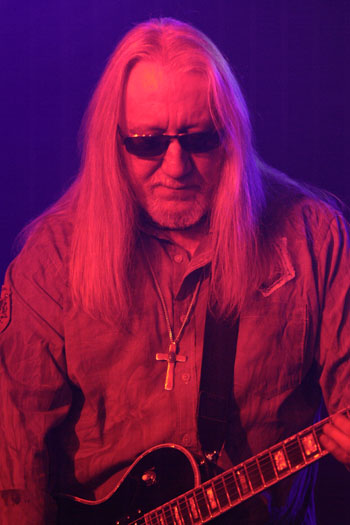
At what point in your career did you realise that touring
would be the most important part of keeping the band together?
As far back as the years before we became Uriah Heep and maybe
10 years before we ever recorded. It was always something we
did.
Last year we covered something like 220 days on the road,
playing 150 plus gigs, and though this year has started a bit
more slowly we'll soon be out there again.
Do you see any irony in the act that several great bands
including Heep signed to an Italian label (Frontiers) to get
into the US?
I don't think of it as a sense of irony so much as just being
grateful that we are with a label that understands our music and
the rock genre in general, and above all backs us up.
The best thing is that they approach the whole thing from a
musical standpoint. It was they who made a strong point about
wanting the new record to be a rock album, and it's worked out
well for both of us I think.
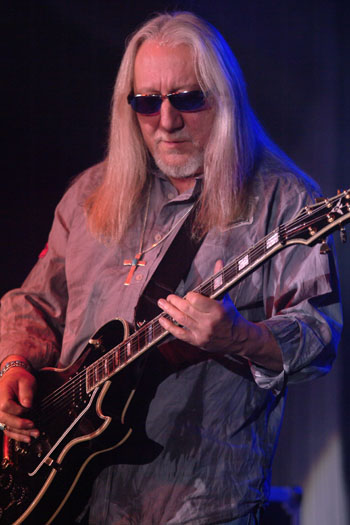
You are the last man standing in Uriah Heep. At what point in
your career, other than when there was just you, did you take up
the reigns of the band?
It more or less falls in your lap. I'd been doing everything
really and when the time came you just take it on. I wanted the
legacy of Heep to continue and I thought we still had more to
give as a band.
I suppose the closest I got to folding the band was round about
the time of the 'Conquest' album'. I really did feel we'd gone
as far as we could go. But even then I was inspired by the
letters sent to the office from long time fans and from people
who had only just caught on to us.
Then there were those who wrote in about the band's music being
the background to their life, so with all that encouragement I
couldn't walk away from it.
Would you say one of the keys to the band longevity is the
fact that you have managed to soak up different influences and
absorbed them into Heep's core sound?
Partly yeah, but there's always been that core sound and I think
it's stood the test of time. It's also the basis of what we
continue to work with and it still provides the nucleus of our
set all these years later.
We are actually rehearsing our 2012 set at the moment and I
think it will include all sorts of stuff - probably too soon to
say exactly what yet - but we are working through material from
down the decades, and if we can still deliver the power of the
songs then we'll do them.
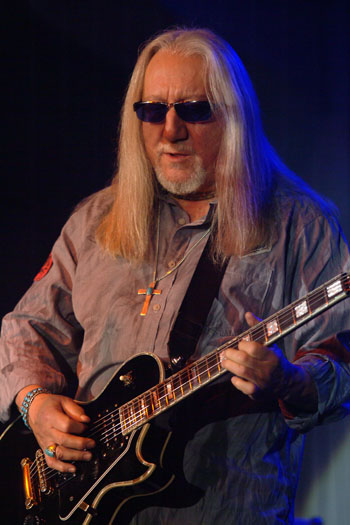
The new album 'Into The Wild' focuses on the band's strengths
of a big organ led sound, strong harmony vocals and big
melodies, was there a conscious attempt to write that way?
We've never strayed too far from what we've done in the past.
The title track for example, came from our keyboard player Phil
Lanzon having read the book and seen the film of 'Into The
Wild', and that gave us a starting point.
Pretty soon however, we had a good hook and lyrics to match and
then it became something radically different and we added our
own story line.
Then there was the title itself which worked well for us. It was
something of a double edged sword as you start with the book and
film, work on the song and eventually record all the rest of the
tracks and complete the album. And by the time you have finished
the whole thing, it's only you, the engineer and the record
company that has heard it. So effectively you are releasing it
'Into The Wild'!
We had a good melody and we had the lyrics for the title track
and then we tried to put the song together. Some of the song was
already written before it turned out to be very different from
what we originally had in mind.
Once again it was the people from the Frontiers record company
who wanted a rock album. We originally envisioned it as
having much more medium tempo stuff.
Let's talk about some of the songs. 'Nail On The Head' is
both the opener and the single, and it really does seem to
reflect the songs title? Was it an obvious choice for a single?
It actually grew out of another song. Our producer Mike
Paxman came up with an idea, and he'd suggest stuff like, 'how
about this and try that' and so it was formulated very quickly.
We actually rehearsed the song in the studio and then recorded
it.
So generally you prefer to work quickly?
Yeah, we're not a band that meanders about (laughs). We don't
take 6 months to work on the snare drum sound. In fact the last
two albums very much like that, we wrote the material, rehearsed
it up, played it live and recorded it.
So you record the material as a band playing together in the
studio?
Yes, the same process, we rehearse it, play it and record it. It
is very much done as a band thing in one pulse. It's a bit of a
rollercoaster with no safety net, in fact it's a bite your nails
job.
I mean the drummer may make a few mistakes which can be sorted.
Our producer Mike might come up with a few ideas, but generally
we try and keep things nice and fresh. I think we also tap into
our collective experience to make the right decision at given
moments.
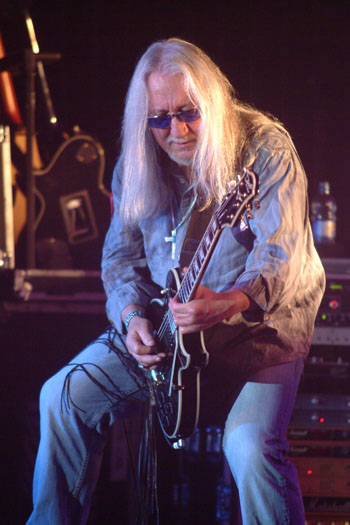
'I Can See You' certainly has Purple influences, but would
you argue that Heep were as much the originators of the intense
organ driven sound as Deep Purple?
Well I think we are up there with them and while they had a big
voice we had the 5 part harmonies which became an integral part
of what we did, almost like an instrument.
It's also still a big part of our sound and especially so on
this album as we are very focussed on the vocals being part of
the song.
There's a drop D riff and lyrics about the feeling of someone
having passed on, but they are still with you. It's us in
spiritual mode if you like, but we widen the parameters to take
in loss in life and try and relate to it, but as part of a big
rock song which I think works really well.
Getting back to the vocal styling of the band, you've also
said that the band's 5 part harmonies made you 'The Beach Boys
of Heavy Metal'. There are certainly strong elements of that on
the new album?
Ha ha, actually I love that quote but it came from a DJ in the
States, and as I said we have five voices and we use them.
'I'm Ready' is one of the album highlights for me. Again it's
an intense hard driving song with a David Byron style vocal.
It's almost early Heep with contemporary accessibility?
I think the song really shows how Bernie (Shaw) is capable of
covering different vocal aspect of the band's history. He's got
his own style but can cover older material as well.
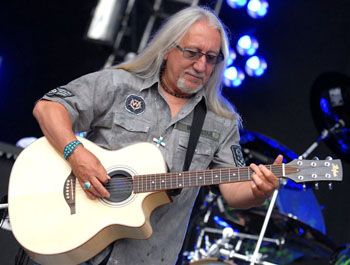
Photo: Lee
Millward
'Trail of Diamonds' almost seems to be two songs in one,
being a gently paced ballad that explodes into a hard rocker
with a big choral finish, Was that how you originally conceived
the song?
It was a bit like 'The Magicians Birthday' template that we used
before, as it's very 'progressive'. We were a bit concerned as
it was going to be another ballad, and then me and Phil sat down
and stated looking at the piece. We continued with the theme and
then got radical and things got a bit louder (laughs)
'Southern Star' is another highlight for me. Written by Phil,
it has an uplifting chorus, early career bv's and a dynamic
guitar break. Do you play it live?
Not so far no. Up to now we've covered 'Nail On The Head', 'Into
The Wild' 'I'm Ready' and 'Money Talk'
'Believe' is a strong harmony led rocker with vocals that
sounds like The Doobie Brothers.
Does it Really? You know you don't always hear those things when
you're so close to a song.
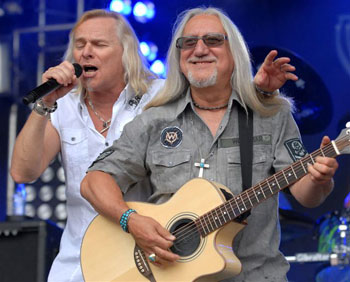
Photo: Lee
Millward
'Kiss of Freedom' starts as a lovely groove with a chanted
chorus and has a jam feel with a Procul Harum style languid
organ line. How did that come about?
It's Phil's song again and we tossed it around a bit. It's a
good showcase for him right at the end. It's great as his work
is often overlooked.
Trevor Bolder's 'Hard Way To Learn is a great bonus track,
which like 'Southern Star', features one of Bernie's best vocal
performances. How come it's a bonus track?
It was actually a difficult song to do and we tried it at a
slower tempo and then rocked it up and ended up working with it
just as it was. It became a bonus track because we didn't think
it fitted into the overall flow of the album
You've written most of the songs with Phil Lanzon, is it a
similar writing process that you had with David Byron, or it is
more keyboard dominated?
No, totally different, especially as David didn't play an
instrument. Back then I had the musical ideas and David would
jump in on them and come up with other ideas. Writing with Phil
is different as we start with the music first and then look to
the lyrics.
Going back to the old days, was 'Look At Yourself' the point
at which you first found your own sound?
Yes it was. When you look back at what we had done before that,
we started with so many different influences on 'Very 'Eavy Very
'Umble', with jazz, blues, folk, rock and on 'Salisbury' we had
a 27 piece ensemble on the title track. So we were searching and
experimenting and it all came together on 'Look at Yourself'.
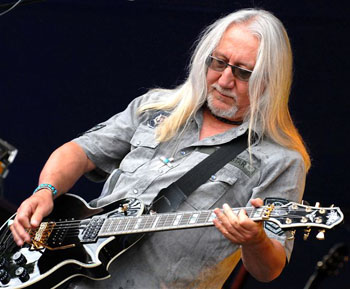
Photo: Lee
Millward
Were songs like the title track and 'July Morning' self
evident classics at the time?
Not particularly no. 'July Morning' for example, was originally
3 separate songs. At the time I had missed a rehearsal 'cos of
flu and when I heard the song I heard three separate ideas and
thought we should maybe put them together and that's what we
did.
How did Osibisa end up jamming on the end of that track?
They were our label mates and we'd bump into them now and again
at shows. So it was an obvious step to ask them really. They
turned up all ganja'd up to buggery (laughs) and we started to
play and as the thing got faster and faster their eyes started
to bulge out of their heads. It was all done in one take,
fantastic.
'Easy Living' was the big song on 'Demons & Wizards', but
other than the fact singles weren't popular back then, why do
you think it didn't chart in the UK?
It was an odd thing really and I don't know the answer. Heep had
a funny/strange relationship with the UK at the time.
We were working our socks off abroad and when we came back home
it was seen as an opportunity to catch up with our families etc,
so we didn't gig much over here and we never really worried
about the UK much at the time.
How was it playing the whole of 'Demons & Wizards' at High
Voltage in 2010?
It was one of those 'WOW' moments, a real blast and a kind of a
flash back. And honestly to see the enjoyment of the crowd and
the band really did make an impact on me.
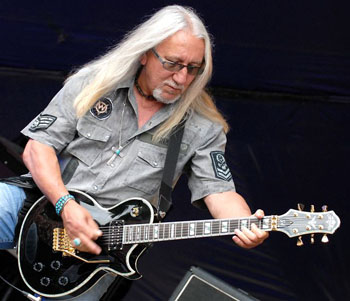
Photo: Lee
Millward
How come you chose 'Demons and Wizard' and not 'Look At
Yourself'?
It's was what the festival organisers asked us to do and they
were paying us (laughs). They wanted us to do the festival but
only if we played the whole of the album, so we said yes let's
do it.
Going back to the band's relationship with the press in the
early 70's, was it just the Brit press that gave you a hard
time?
It was strange time for us. I think both Zeppelin and Purple
were both well established and the music scene in London was
changing with folk rock on the up and we came in at the end of
that change. The press used to slate us, but we still did very
well and it was the fact that fans were still buying the albums
and concert tickets that made us a 'people's band' and that's
what has sustained over the years I think.
Thinking about the loss of both Gary Thain and David Byron
was there ever a point where you thought about folding the band
at that point?
At that juncture no, as I still felt there was a lot of momentum
there. And on that basis I wanted to carry on the tradition of
the band and keep it alive. I was affected when both Gary and
David died, but it didn't really hit home until later.
What about when 'Different World' failed to chart anywhere?
Did that make you more resilient for the future?
Very much so. I think given the background to the making of that
album it was actually feather in our cap for the band.
When we joined PRT the record company, there was something like
three different floors of offices. They also had their own
studio and 50 parking spaces.
We were bang in the middle of it all when the budget ran out and
the whole things shrivelled to just one man, a phone and his
desk! So with no budget to record we suffered a lot.
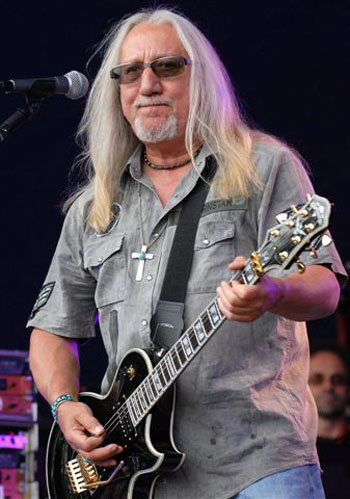
Photo: Lee
Millward
Was David Byron always predisposed to excess or was it a
gradual thing?
David was always a 100% full on character, I mean even if he was
to walk into the Royal Albert Hall you'd know he was there. You
could see it most clearly in his vocals, he'd totally lose
himself in the moment of the song. Unfortunately that side of
him spilled over into other things….
When Ken left the band there was friction over the use of his
songs rather than other band members songs, but surely he'd
written the big hitters?
The rest of the band thought there was too much of an unfair
relationship between our manager Gerry Bron and Ken. I suppose
Gerry could see where the money was coming from (the songs), so
the two of them were very creative but it didn't give anyone
else in the band an opportunity to get a look in.
By the time of 1977's 'Firefly' you were getting decent
reviews again, and had a hit with the single 'Wiseman'. And yet
it was the first Heep album not to chart in the UK since
'Salisbury'. Did that bug you at the time?
That was back in the John Lawton days and we were very big in
Germany so it didn't really matter to us. We were enjoying great
success over there and I think we even had three top ten
singles, so we put all our focus into that tour.
'Innocent Victim' was released later that same year and was
also successful in Germany. Did you feel you had to change your
style to suite that market? I'm thinking of songs like 'The
Dance' which although having a reggae arrangement had an obvious
MOR appeal?
Well yeah…I still like that song 'The Dance' actually, but as
regards our style, it was what we were doing at the time rather
than a conscious change, and it seemed to work well so we kept
on going.
By the time of 1980's 'Conquest' you seemed to have softened
up the sound and yet ironically it was at the time of the
British NWOHM
Yeah typical, I think we lost the plot at this point (laughs).
John Sloman was singing for us and he came to us highly
recommended and had sung in a great band Lone Star. He was also
a multi instrumentalist and was good looking, but he was never
really accepted by the Heep faithful. I think it was because he
insisted on singing 'July Morning' like Steve Wonder, while
other times he was too much like Robert Plant.
The band didn't record a studio album between 'Sonic Origami'
and 'Wake The Sleeper' (1998 -2008) because you couldn't get the
right kind of deal. If the right opportunity had arisen would
you have the material ready?
Yes I think so. I'm always constantly writing, even though some
of the stuff will never make it into the band. But the truth is
we've always responded best to set deadlines. If someone had
come up to us and set a deadline a few months before an album
and said we need new material, then we would have done it.
Whose idea was it to revisit the band's classic material on
'Celebration?'
That came from our German record company Edel. They thought
Uriah Heep was music they could sell. It also gave us the
opportunity to leave our nostalgic calling card, but we were
also able to add a few new things like 'Only Human' and
'Corridors of Madness' to show we are still working. We recorded
the whole thing quickly and it was all live in the studio
including the solos
In the early 80's did MTV exposure help to being you back
into fashion in the States?
Yes and it helped 'That's The Way It Is' (from Abominog) to
crack the Top 40. But as regards the making of the videos we all
got fed up with hanging around. Sometimes you'd be on call from
7am and sometimes nothing would actually happen until 7pm. But
it was a great way to hit a big market of course.
Thinking about touring, you enjoyed huge success in the old
USSR and toured non traditional territories like South Korea and
Brazil. Did a lot of people know your stuff already or was your
popularity down to it being their first exposure to a western
rock band?
It was amazing - I mean you couldn't fail to be amazed - they
knew everything, going right back to the old days and they all
sang the words to every song. There were also lots of young
people too, especially in places like Venezuela, which we really
didn't expect at all. In fact we couldn't believe it.
Do you still enjoy rock music outside of Heep or is the band
so time consuming that you don't get a chance to hear much else?
Yes of course I still try and keep in touch with things, though
I'm not necessarily impressed by a lot of it. (laughs).
But yes you can't have tunnel vision in this business. My motto
is that you can always learn from things, even when you hear
something bad. You learn not to do it.(laughs).
Interview
March 2012 © Pete Feenstra & GRTR!
Photos by Noel Buckley except where indicated
'Into The Wild' is released by Frontiers Records
Album review
 |
Print this page in printer-friendly format |
 |
Tell a friend about this page |
|












